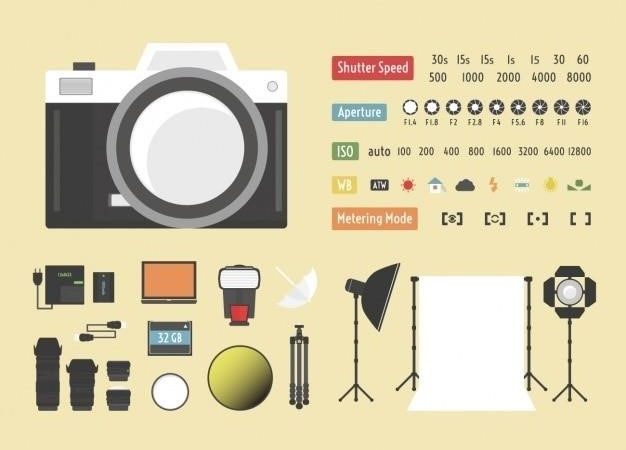mercury outboard service manual

Mercury Outboard Service Manual⁚ A Comprehensive Guide
This comprehensive guide provides a detailed overview of maintaining and repairing your Mercury outboard motor․ From routine maintenance tasks to advanced repairs, we’ll cover everything you need to know to keep your engine running smoothly and reliably․ Whether you’re a seasoned boater or a first-time owner, this manual will equip you with the knowledge and tools necessary to ensure a safe and enjoyable boating experience․
Introduction
Mercury outboard motors are renowned for their performance, reliability, and durability․ However, like any complex piece of machinery, they require regular maintenance and occasional repairs to ensure optimal operation․ This service manual is your comprehensive guide to understanding your Mercury outboard, performing routine maintenance tasks, troubleshooting common issues, and tackling advanced repairs․
Understanding Your Mercury Outboard
Before diving into maintenance and repairs, it’s crucial to familiarize yourself with the basic components and workings of your Mercury outboard․ This section will provide an overview of the key parts, different engine types, and how to identify your specific model․
Basic Components
A Mercury outboard engine consists of various interconnected parts that work together to generate power․ Some key components include the powerhead, lower unit, propeller, fuel system, ignition system, cooling system, and control system․ Understanding the function of each component is essential for diagnosing issues and performing repairs․
Engine Types
Mercury offers a wide range of outboard engine types, each with its own unique features and applications․ Some common types include two-stroke, four-stroke, and direct-injection engines․ Two-stroke engines are known for their lightweight design and high power output, while four-stroke engines are generally more fuel-efficient and environmentally friendly․ Direct-injection engines combine the best features of both, offering both performance and efficiency․
Model Identification
Identifying your Mercury outboard model is crucial for obtaining the correct parts, service manuals, and troubleshooting information․ The model number is typically located on a decal on the engine cowling or transom bracket․ It will include a series of numbers and letters that indicate the engine’s size, year of manufacture, and specific features․

Routine Maintenance
Regular maintenance is essential for keeping your Mercury outboard running smoothly and extending its lifespan․ By performing routine tasks such as pre-season checks, oil changes, and spark plug replacements, you can prevent major issues and ensure optimal performance․ A well-maintained engine is also safer and more reliable, allowing you to enjoy your boating adventures with peace of mind․
Pre-Season Checkup
Before launching your boat for the season, it’s crucial to perform a thorough pre-season checkup․ This includes inspecting the engine’s fluids, checking for leaks, and ensuring that all systems are in good working order․ This proactive approach can help identify potential problems before they become major issues, ensuring a safe and enjoyable boating experience․
Oil Change
Regular oil changes are essential for maintaining the health of your Mercury outboard engine․ Follow the recommended oil change intervals specified in your owner’s manual․ Using the correct type and viscosity of oil is crucial for proper engine lubrication and performance․ A clean oil filter is also important for preventing debris from entering the engine․
Spark Plug Replacement
Spark plugs play a vital role in igniting the fuel-air mixture in your Mercury outboard engine․ Worn or fouled spark plugs can lead to starting problems, reduced performance, and increased fuel consumption․ Replace your spark plugs according to the recommended intervals in your owner’s manual․ Always use spark plugs that meet the specifications for your engine model․
Fuel System Cleaning
A clean fuel system is essential for optimal engine performance and longevity․ Over time, deposits can build up in the fuel lines, carburetor, and fuel injectors, hindering fuel flow and causing starting and running problems․ Regularly clean your fuel system using a fuel system cleaner specifically designed for marine engines․ This will help remove deposits and prevent future buildup․
Cooling System Inspection
The cooling system is vital for preventing overheating and engine damage․ Regularly inspect the water intake, impeller, and thermostat to ensure proper water flow․ Check for any blockages, corrosion, or wear․ Replace the impeller and thermostat as needed to maintain efficient cooling and prevent engine damage․
Troubleshooting Common Issues
This section will guide you through identifying and resolving common issues that may arise with your Mercury outboard․ From starting problems to loss of power, we’ll cover a range of potential issues and provide practical troubleshooting tips to get your engine back in working order․
Starting Problems
If your Mercury outboard is having trouble starting, there are several potential causes․ Check the fuel supply, battery connection, spark plugs, and fuel lines for any obstructions or defects․ Additionally, ensure the engine is getting proper air intake and that the choke is operating correctly․
Overheating
An overheated Mercury outboard can be a serious problem․ Check the cooling system for blockages, inspect the impeller for wear or damage, and ensure adequate water flow through the engine․ Additionally, verify that the thermostat is functioning properly and that the cooling water passages are clear․
Loss of Power
A loss of power in your Mercury outboard could be caused by a variety of issues․ Start by checking the fuel system for blockages or leaks․ Inspect the spark plugs for wear or fouling, and ensure the ignition system is functioning properly․ Additionally, check the carburetor for proper operation and the fuel pump for adequate pressure․
Unusual Noises
Any unusual noises coming from your Mercury outboard should be investigated promptly․ A knocking sound may indicate a problem with the engine bearings or connecting rods․ A grinding noise could be a sign of a worn impeller or a problem with the transmission․ Listen carefully and try to identify the source of the noise to pinpoint the potential issue․
Advanced Repairs
For more complex repairs, it’s recommended to consult a qualified Mercury dealer or a certified marine mechanic․ These repairs require specialized tools and knowledge, and attempting them without proper training can lead to further damage or injury․
Carburetor Overhaul
A carburetor overhaul involves disassembling, cleaning, and rebuilding the carburetor to restore its proper fuel delivery function․ This may be necessary if you experience starting problems, rough idling, or loss of power․ The process requires careful attention to detail and specialized tools for proper cleaning and reassembly․
Impeller Replacement
The impeller is a crucial component of the cooling system, responsible for circulating water through the engine to prevent overheating․ Regular replacement is essential to ensure proper cooling and prevent engine damage․ This process involves accessing the water pump housing, removing the old impeller, and installing a new one․ It’s important to follow the manufacturer’s instructions carefully and use the correct type of impeller for your specific engine model․
Fuel Pump Repair
The fuel pump delivers fuel from the tank to the carburetor, ensuring a consistent flow of fuel to the engine․ If your engine experiences starting problems or a loss of power, a faulty fuel pump could be the culprit․ Repairing a fuel pump often involves inspecting the diaphragm, checking for leaks, and potentially replacing worn components․ Consult your service manual for specific repair procedures and replacement parts․
Electrical System Diagnosis
The electrical system of your Mercury outboard is critical for ignition, starting, and various other functions․ Diagnosing electrical issues often involves testing components like the starter motor, battery, wiring, and ignition system․ A multimeter is a valuable tool for troubleshooting electrical problems․ Consult your service manual for specific diagnostic procedures and wiring diagrams․
Safety Precautions
Working on your Mercury outboard requires attention to safety․ Always disconnect the battery before performing any maintenance or repairs․ Use appropriate personal protective equipment, including safety glasses, gloves, and closed-toe shoes․ Be mindful of moving parts and hot surfaces, and work in a well-ventilated area․ Refer to your service manual for specific safety warnings and procedures․
Working with Fluids
When working with fluids like oil, fuel, and coolant, always wear appropriate protective gear, including gloves and eye protection․ Dispose of these fluids responsibly in accordance with local regulations․ Avoid spilling fluids on the ground, and clean up any spills immediately․ Never mix different types of fluids, and refer to your service manual for specific fluid recommendations․
Handling Tools
Use the correct tools for the job and ensure they are in good working condition․ Avoid using damaged or worn tools, as they can lead to injury or damage to your engine․ Always use proper lifting techniques to prevent injury, and never attempt to lift heavy objects alone․ Store tools safely and securely after use․
Electrical Safety
Always disconnect the battery before working on any electrical components․ Be cautious of live wires and avoid contact with them․ Use insulated tools and wear appropriate safety gear, such as gloves and eye protection․ If you are unsure about any electrical work, consult a qualified mechanic․
Resources
For additional information, parts, and service, you can access a wealth of resources⁚
- Mercury Outboard Website⁚ The official Mercury Marine website provides comprehensive information on all their products, including service manuals, parts catalogs, and troubleshooting guides․
- Authorized Dealers⁚ Locate a Mercury authorized dealer near you for expert service, repairs, and parts․
- Online Forums⁚ Join online boating forums and communities to connect with other Mercury outboard owners, share experiences, and seek advice․
Mercury Outboard Website
The official Mercury Marine website is a treasure trove of information for Mercury outboard owners․ You can find detailed service manuals, parts catalogs, troubleshooting guides, and even owner’s manuals for your specific model․ The website also provides access to product updates, warranty information, and dealer locator tools;
Authorized Dealers
For expert service and genuine Mercury parts, it’s always best to visit an authorized Mercury dealer․ These dealers are trained and equipped to handle all aspects of Mercury outboard maintenance and repair, from routine servicing to complex engine overhauls․ You can find a dealer near you using the dealer locator tool on the Mercury Marine website․
Online Forums
Online forums dedicated to boating and Mercury outboards can be invaluable resources for troubleshooting issues, sharing tips, and connecting with fellow enthusiasts․ These forums often feature experienced mechanics and knowledgeable users who can provide advice and support․ Popular forums include the Mercury Marine Owners Group on Facebook and various boating-specific forums․
Conclusion
By following the guidance outlined in this manual, you can ensure the longevity and optimal performance of your Mercury outboard motor․ Regular maintenance, proper troubleshooting, and a commitment to safety will allow you to enjoy countless hours on the water․ Remember, consult with a qualified mechanic for any complex repairs or if you are unsure about any procedures;





